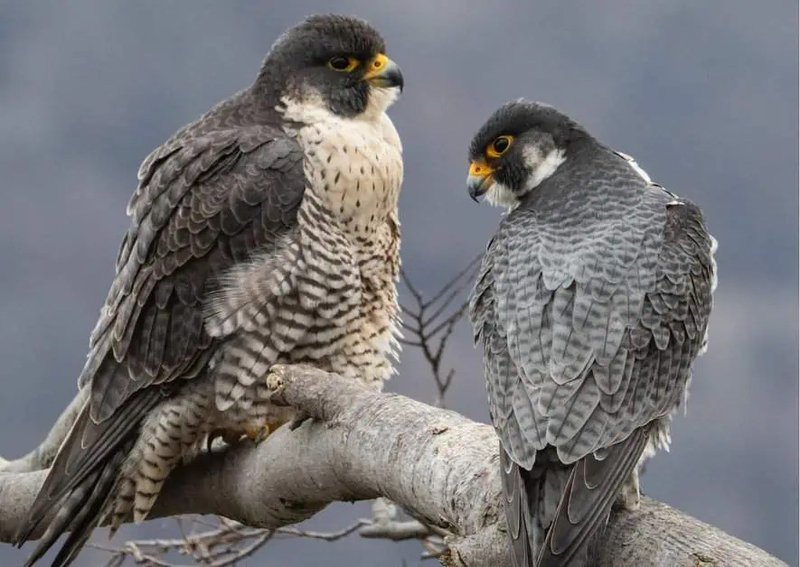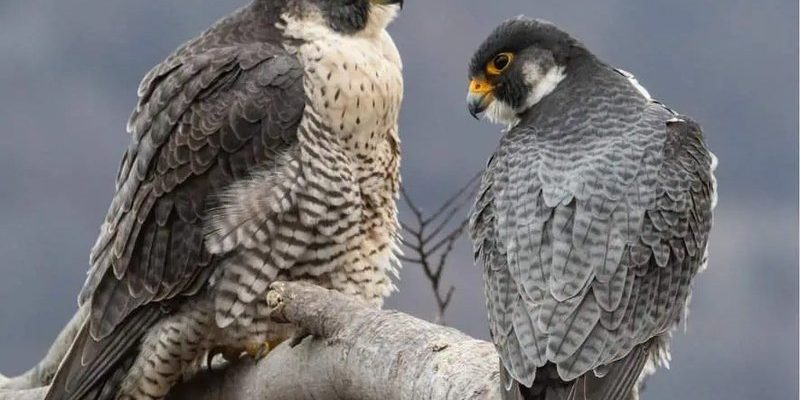
Imagine playing a game of chess, where every move matters and strategy is key. That’s sort of how a peregrine falcon operates in its environment. They have to be quick thinkers, making split-second decisions that can affect their success in hunting and navigating their territory. With that in mind, let’s explore their cognitive abilities and behavior, which make them one of nature’s most fascinating creatures.
The Intelligence of Peregrine Falcons
Peregrine falcons are often recognized for their *mind-blowing speed,* reaching over 240 mph in a dive, making them the fastest bird in the world. But beyond their physical prowess, their intelligence sets them apart. These birds exhibit advanced problem-solving skills and adaptability. You might be surprised to learn that their hunting strategy is a perfect example of this intelligence in action.
When hunting, peregrine falcons use a combination of vision and tactical thinking to spot prey from great heights. Their extraordinary eyesight allows them to see things up to three miles away—think of it like having binoculars built right into their eyes! Once they spot a target, they dive at incredible speeds, often surprising their prey. This combination of mental and physical abilities showcases their remarkable intelligence, as they have to assess the situation and react quickly.
Another fascinating aspect of their intelligence is their ability to learn from experience. Studies have shown that pigeons, for example, can remember locations and associate them with food sources. Similarly, peregrine falcons can adjust their hunting tactics based on past successes and failures. This ability to adapt and learn is a hallmark of intelligent behavior, which is not as common in many other bird species.
Complex Social Behavior
You might not think of birds as social creatures, but peregrine falcons have their own ways of interacting with each other. During mating season, these birds engage in elaborate courtship displays, which often include aerial acrobatics. The male will fly high in the sky, then dive dramatically, showcasing his skill. This isn’t just for show; it’s also a way to demonstrate his fitness as a mate.
Peregrine falcons are known to be monogamous, often forming lifelong pairs. After they mate, they work together to establish a territory, which they defend against intruders. Communication plays a critical role here. They have a range of calls that signal different emotions or alerts. So, whether they’re expressing distress or excitement, these vocalizations are essential for maintaining their bond and coordinating actions.
You might be wondering how they coordinate during a hunt. Well, studies indicate that peregrine falcons can hunt in pairs or groups, using teamwork to flush out prey. This cooperative behavior not only highlights their intelligence but also their ability to work together effectively in the wild, much like a well-rehearsed team.
Memory and Learning Capabilities
Now, let’s dive into another aspect of a peregrine falcon’s cognitive abilities: *memory.* Research has shown that these birds have excellent memories, which help them navigate their environment. They can remember the locations of their nests, the best hunting sites, and even the patterns of their prey.
When fledglings are raised, they learn from observing their parents. This observation isn’t just about mimicry; it’s a learning process. Young falcons watch how their parents hunt, where they find food, and how they navigate their territory. Once they leave the nest, they carry this knowledge with them, allowing them to thrive in their environment. This ability to learn and remember experiences is a sign of advanced cognitive function that further enhances their survival skills.
Interestingly, peregrine falcons can also adapt their hunting strategies over time based on what they’ve learned. For example, if a particular hunting method isn’t yielding results, they’ll adjust and try something new. Their flexibility in problem-solving is an essential part of their intelligence, making them one of the most adept hunters in nature.
Tool Use and Problem Solving
While it might not be common to hear about birds using tools, some studies suggest that peregrine falcons may exhibit *creative problem-solving* skills. Though not as prominent as in some other species, like crows, there have been instances where these birds have used their environment to their advantage.
For example, peregrine falcons can figure out how to use the landscape around them to hide from their prey or to surprise them during a dive. Their ability to manipulate their environment demonstrates a level of cognitive ability often associated with more intelligent animals. It’s like having a toolbox in their mind, where they can pull out different strategies based on the situation at hand.
Additionally, young falcons have been observed experimenting with different techniques while hunting, showing a level of curiosity and exploration. This trial-and-error approach is not just play; it’s a critical part of their learning process, allowing them to refine their skills as they grow.
So, how smart is a peregrine falcon? Honestly, they’re much more intelligent than you might expect. From their incredible speed and problem-solving abilities to their complex social interactions, these birds truly stand out in the avian world. Their cognitive skills aren’t just about hunting; they reflect adaptability and learning, which are essential for survival.
Understanding the intelligence of peregrine falcons gives us a deeper appreciation for these magnificent creatures. They’re not just the fastest animals on the planet; they’re also clever and adaptable, making them one of nature’s most impressive hunters. Next time you see one soaring overhead, take a moment to appreciate the remarkable mind behind that swift frame. You’ll be looking at a true feathered genius!

